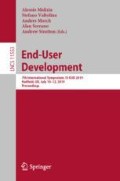Abstract
The widespread introduction of the Internet of Things into people’s daily lives calls for approaches that allow even unskilled end users to autonomously configure their own smart environments. Various tools, either research or commercial, are available, which allow end users to combine smart objects and services for creating applications that meet their needs. However, challenging issues do persist, including interaction paradigms adequate to end users, as well as the ability to control that the created applications will do what they are intended to. This work-in-progress proposes the integration of two recently developed tools, in order to overcome some limitations of the existing solutions.
Access this chapter
Tax calculation will be finalised at checkout
Purchases are for personal use only
References
Atzori, L., Iera, A., Morabito, G.: The Internet of Things: a survey. Comput. Netw. 54(15), 2787–2805 (2010)
Fischer, G., Giaccardi, E., Ye, Y., Sutcliffe, A., Mehandjiev, N.: Meta-design: a manifesto for end-user development. Commun. ACM 47(9), 33–37 (2004)
Lieberman, H., Paternò, F., Klann, M., Wulf, V.: End-user development: an emerging paradigm. In: Lieberman, H., Paternò, F., Wulf, V. (eds.) End User Development. Human-Computer Interaction Series, vol. 9, pp. 1–8. Springer, Dordrecht (2006). https://doi.org/10.1007/1-4020-5386-X_1
Ardito, C., Buono, P., Costabile, M.F., Lanzilotti, R., Piccinno, A.: End users as co-designers of their own tools and products. J. Vis. Lang. Comput. 23(2), 78–90 (2012)
Barricelli, B.R., Cassano, F., Fogli, D., Piccinno, A.: End-user development, end-user programming and end-user software engineering: a systematic mapping study. J. Syst. Softw. 149, 101–137 (2019)
Costabile, M.F., Fogli, D., Mussio, P., Piccinno, A.: Visual interactive systems for end-user development: a model-based design methodology. IEEE Trans. Syst. Man Cybern. - Part A: Syst. Hum. 37(6), 1029–1046 (2007)
Pane, J.F., Ratanamahatana, C.A., Myers, B.A.: Studying the language and structure in non-programmers’ solutions to programming problems. Int. J. Hum.-Comput. Stud. 54(2), 237–264 (2001)
Ceri, S., Daniel, F., Matera, M., Facca, F.M.: Model-driven development of context-aware Web applications. ACM Trans. Internet Technol. 7(1), 2 (2007)
Daniel, F., Matera, M., Pozzi, G.: Managing runtime adaptivity through active rules: the Bellerofonte framework. J. Web Eng. 7(3), 179–199 (2008)
Dey, A.K., Sohn, T., Streng, S., Kodama, J.: iCAP: interactive prototyping of context-aware applications. In: Fishkin, K.P., Schiele, B., Nixon, P., Quigley, A. (eds.) Pervasive 2006. LNCS, vol. 3968, pp. 254–271. Springer, Heidelberg (2006). https://doi.org/10.1007/11748625_16
Wajid, U., Namoun, A., Mehandjiev, N.: Alternative representations for end user composition of service-based systems. In: Costabile, M.F., Dittrich, Y., Fischer, G., Piccinno, A. (eds.) IS-EUD 2011. LNCS, vol. 6654, pp. 53–66. Springer, Heidelberg (2011). https://doi.org/10.1007/978-3-642-21530-8_6
Caivano, D., Fogli, D., Lanzilotti, R., Piccinno, A., Cassano, F.: Supporting end users to control their smart home: design implications from a literature review and an empirical investigation. J. Syst. Softw. 144, 295–313 (2018)
Fogli, D., Lanzilotti, R., Piccinno, A.: End-user development tools for the smart home: a systematic literature review. In: Streitz, N., Markopoulos, P. (eds.) DAPI 2016. LNCS, vol. 9749, pp. 69–79. Springer, Cham (2016). https://doi.org/10.1007/978-3-319-39862-4_7
Coutaz, J., Crowley, J.L.: A first-person experience with end-user development for smart homes. IEEE Pervasive Comput. 15(2), 26–39 (2016)
Manca, M., Paternò, P., Santoro, C., Corcella, L.: Supporting end-user debugging of trigger-action rules for IoT application. Int. J. Hum.-Comput. Stud. 123, 56–69 (2019)
Desolda, G., Ardito, C., Matera, M.: Empowering end users to customize their smart environments: model, composition paradigms, and domain-specific tools. ACM Trans. Comput.-Hum. Interact. 24(2), 12 (2017)
Desolda, G., Ardito, C., Matera, M.: EFESTO: a platform for the end-user development of interactive workspaces for data exploration. In: Daniel, F., Pautasso, C. (eds.) RMC 2015. CCIS, vol. 591, pp. 63–81. Springer, Cham (2016). https://doi.org/10.1007/978-3-319-28727-0_5
Desolda, G., Ardito, C., Matera, M.: Specification of complex logical expressions for task automation: an EUD approach. In: Barbosa, S., Markopoulos, P., Paternò, F., Stumpf, S., Valtolina, S. (eds.) IS-EUD 2017. LNCS, vol. 10303, pp. 108–116. Springer, Cham (2017). https://doi.org/10.1007/978-3-319-58735-6_8
Ardito, C., Buono, P., Desolda, G., Matera, M.: From smart objects to smart experiences: An end-user development approach. Int. J. Hum.-Comput. Stud. 114, 51–68 (2018)
Ardito, C., et al.: User-driven visual composition of service-based interactive spaces. J. Vis. Lang. Comput. 25(4), 278–296 (2014)
Ghiani, G., Manca, M., Paternò, F., Santoro, C.: Personalization of context-dependent applications through trigger-action rules. ACM Trans. Comput.-Hum. Interact. 24(2), 1–33 (2017)
Acknowledgments
This work is partially supported by the Italian Ministry of University and Research (MIUR) under grant PRIN 2017 “EMPATHY: EMpowering People in deAling with internet of THings ecosYstems”.
Author information
Authors and Affiliations
Corresponding author
Editor information
Editors and Affiliations
Rights and permissions
Copyright information
© 2019 Springer Nature Switzerland AG
About this paper
Cite this paper
Ardito, C. et al. (2019). Improving Tools that Allow End Users to Configure Smart Environments. In: Malizia, A., Valtolina, S., Morch, A., Serrano, A., Stratton, A. (eds) End-User Development. IS-EUD 2019. Lecture Notes in Computer Science(), vol 11553. Springer, Cham. https://doi.org/10.1007/978-3-030-24781-2_24
Download citation
DOI: https://doi.org/10.1007/978-3-030-24781-2_24
Published:
Publisher Name: Springer, Cham
Print ISBN: 978-3-030-24780-5
Online ISBN: 978-3-030-24781-2
eBook Packages: Computer ScienceComputer Science (R0)

